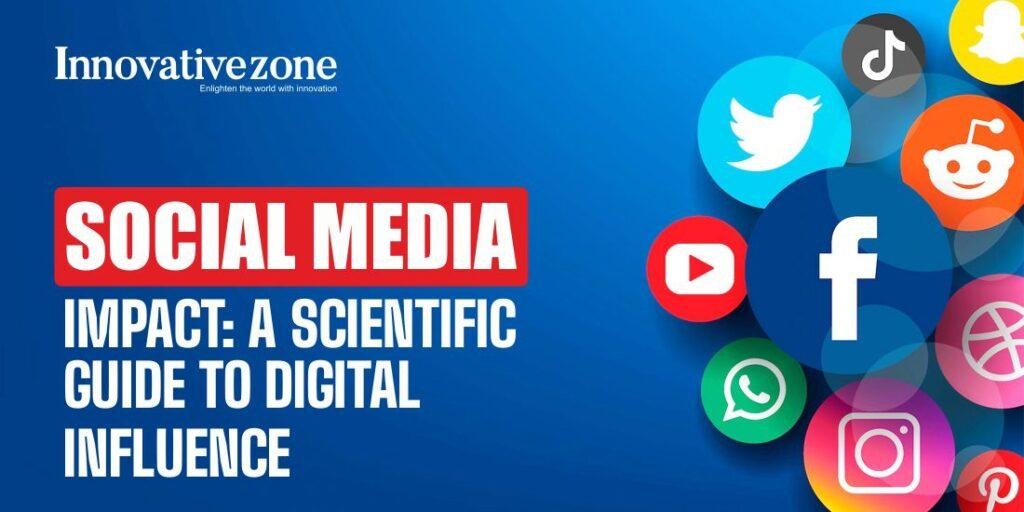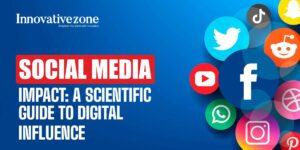Social media impact: a scientific guide to digital influence
Written By Jaya Pathak
Social media has become a powerful force in today’s digital age and its impact on society, including the scientific community is undeniable. In recent years, researchers and scientists have recognized the potential of social media platforms for disseminating knowledge, engaging with the public, and fostering collaboration. Social media platforms provide scientists with an efficient means of sharing their research findings and scientific knowledge with a global audience.
Researchers can use platforms like Twitter, Facebook and LinkedIn to post links to their published papers, share preprints or provide updates on ongoing studies. This allows scientists to reach a broader audience beyond traditional academic circles and facilitates the rapid spread of information. Social media has emerged as a vital tool for science communication and public engagement. Scientists can use platforms like Instagram, YouTube etc, to create engaging content that explains complex scientific concepts in a more accessible and relatable manner. By using visual aids, videos and storytelling techniques, researchers can bridge the gap between the scientific community and the general public, fostering scientific literacy and interest.
Social media platforms facilitate networking and collaboration among scientists across different disciplines and geographical locations. Online communities, such as ResearchGate and Academia.edu, allow researchers to connect, share ideas and collaborate on projects. Additionally, platforms like Twitter have become virtual meeting places for scientists to discuss their work, exchange insights and form interdisciplinary collaborations. Also, social media platforms enable the collection and analysis of real- time data. Researchers can monitor discussions, trends and sentiment on platforms like Twitter to gain insights into public opinion, track disease outbreaks, or assess the impact of scientific findings.
Moreover, social media can be utilized for crowdsourcing efforts, where scientists engage with the public to gather data or participate in citizen science projects. It empowers scientists to engage in science advocacy and influence policy discussions. Researchers can use their online presence to raise awareness about scientific issues, promote evidence- based decision- making and counteract mis-information. By building a strong online presence and leveraging their expertise, scientists can shape public opinion and contribute to science- informed policies. Social media has revolutionized the way scientists communicate, collaborate and engage with the public.
It provides a platform for knowledge dissemination, science outreach, networking, and real- time data analysis. By effectively utilizing social media, scientists can enhance their digital influence and contribute to the advancement of science and society.
The impact of Social Media on Society
The impact of social media on society has been profound, shaping various aspects of our lives and transforming the way we communicate, interact and consume information. While social media offers numerous benefits, it also presents challenges and potential negative consequences. Here are some key aspects of social media’s impact on society:-
- Communication and Connectivity:-Social media platforms have revolutionized communication by providing instant and widespread connectivity. People can connect with friends, family and acquaintances globally, share updates and engage in real- time conversations. It has made communication more accessible, convenient and efficient.
- Information Sharing and Access:-Social media enables the rapid dissemination and sharing of information. News, opinions and content can spread rapidly through social networks, allowing for greater access to diverse perspectives and breaking news. However, the ease of sharing information has led to the proliferation of misinformation and the challenge of discerning credible sources.
- Social interactions and relationships:-Social media has influenced the nature of social interactions and relationships. It allows people to maintain connections and engage with others virtually, bridging geographical distances. However, some argue that excessive use of social media can lead to feelings of isolation, addiction and a sense of shallow or superficial relationships.
- Self-Presentation and Identity:-Social media platforms offer opportunities for self- expression and self- presentation. Users can create their online personas, selectively sharing content and presenting themselves in specific ways. This can shape personal identity, but it also raises concerns about authenticity, self- esteem and the pressure to conform to certain standards.
- Influence on culture and trends:-Social media has become a powerful influencer of popular culture, trends and public opinion. It can shape societal norms, influence consumer behaviour and generate viral trends or movements. However, this influence can also be manipulated and exploited for commercial or political purposes, leading to echo chambers and filter bubbles.
- Privacy and Security Concerns:-Social media raises significant privacy and security concerns. User’s personal information, data and online activities can be collected, analysed and potentially misused. Additionally, issues of cyberbullying, harassment and online scams have emerged as challenges in the social media landscape.
- Mental Health and Well-being:-The impact of social media on mental health is a topic of ongoing research and debate. Excessive use, social comparison and exposure to negative content can contribute to increased stress, anxiety and depression. However, social media also provides platforms for support communities, raising mental health awareness and access to resources.
The Impact of Social Media on Marketing and Business
The impact of social media on marketing and business has been significant, transforming the way companies promote their products or services and interact with their target audience. Here are some key points to consider:-
- Increased Reach and Audience:-Social media platforms provide businesses with the opportunity to reach a vast and diverse audience. Companies can connect directly with their target market, engage in conversations, and build relationships with customers through interactive content, comments and messages.
- Cost-Effective Marketing:-Social media offers cost-effective marketing strategies compared to traditional advertising channels. Companies can create and share content, run targeted ads and leverage analytics tools to measure the effectiveness of their campaigns, all within budget-friendly parameters.
- Brand Building and Awareness:-Social media allows business to build and reinforce their brand identity. They can showcase their values, mission and unique selling propositions through compelling visuals, engaging content and consistent messaging, thereby increasing brand awareness and recognition.
- Customer Insights and Market Research:-Social media platforms provide a wealth of customer data and insights that can inform business strategies. Companies can gain valuable information about customer preferences, behaviour and feedback, enabling them to refine their products or services and tailor their marketing efforts accordingly.
- Enhanced targeting and personalization:-Social media platforms offer advanced targeting options based on demographics, interests and behaviours. Business can tailor their messages to specific audience segments, resulting in more personalized and relevant marketing campaigns.
Positive Effects of Social Media
- Enhanced Connectivity:-Social media platforms enable people to connect with friends, family and acquaintances across distances. It facilitates communication and helps maintain relationships, even when physical meetings are challenging.
- Increased Awareness and Activism:-Social media has become a powerful tool for spreading information and raising awareness about important social, environmental and political issues. It allows individuals to become more informed and engaged in causes they care about.
- Community Building:-Social media provides a platform for people with shared interests or experiences to come together and form communities. It fosters a sense of belonging and allows individuals, support networks and niche communities.
- Educational Opportunities:-Social media platforms offer vast educational resources, such as online courses, tutorials and informative content. It enables individuals to learn new skills, access educational materials and stay updated on various subjects of interest.
- Business and Entrepreneurship:-Social media has revolutionized the way businesses operate and reach their target audience. It offers cost-effective marketing strategies, direct customer engagement and opportunities for entrepreneurs to showcase their products or services to a global audience.
- Networking and Career Advancement:-Social media provides a platform for professionals to expand their networks, connect with industry peers, and explore career opportunities. It allows individuals to showcase their skills, accomplishments and expertise, potentially leading to career advancements or job offers.
- Personal Development and Self-Expression:-Social media encourages individuals to express themselves creatively and share their thoughts, ideas and experiences. It can boost confidence, promote self-reflection and provide an outlet for personal expression.
- Support and Mental Health Resources:-Social media offers a space where individuals can seek emotional support, connect with support groups and access mental health resources. It helps reduce stigma surrounding mental health and provides a platform for individuals to share their stories and
- Cultural Exchange and Diversity Appreciation:-Social media allows individuals from different cultures and backgrounds to connect, exchange ideas and gain a deeper understanding of various perspectives. It promotes diversity appreciation, cross-cultural communication and fosters a sense of global community.
- Real-Time News and Information:-Social media platforms have become valuable sources of real- time news updates, enabling individuals to stay informed about local and global events. It provides a platform for citizen journalism, where users can share news, images and videos instantly, contributing to the democratization of information.
Negative Effects of Social Media
- Addiction and Time Wasting:-Social media can be addictive, leading to excessive use and a significant waste of time. Excessive scrolling and constant checking of notifications can negatively impact productivity, sleep patterns and overall well-being.
- Cyberbullying and Online Harassment:-Social media platforms can be breeding grounds for cyberbullying, harassment and online hate. Users may face verbal abuse, threats or the spreading of harmful rumours, leading to psychological distress and even long- term consequences.
- Mental Health Issues:-Social media has been linked to various mental health problems, including anxiety, depression and low self-esteem. Constant comparison to others, unrealistic beauty standards and FOMO can contribute to the feelings of inadequacy and social isolation.
- Privacy Concerns and Data Security:-Social media platforms often collect and store vast amounts of personal data, which can be vulnerable to security breaches and privacy violations. Users may face risks such as identity theft, unauthorized access and the misuse of personal information.
- Disruption of Authentic Communication:-Social media interactions can lack the depth and authenticity of face-to-face communication. Online interactions may lead to miscommunication, misunderstanding and the erosion of real-life social skills and relationships.
- Distorted Reality and Self-comparison:-Social media often presents a highly curated version of people’s lives, showcasing only the positive and glamorous aspects. This can create unrealistic expectations and a distorted perception of reality.
- Online Fraud and Scams:-Social media platforms can be used by scammers and fraudsters to deceive and exploit unsuspecting users. Fake profiles, phishing attempts and deceptive advertising can lead to financial losses and identity theft.
Thus, social media has both negative as well as positive effect. Therefore, it is crucial for us to develop a balanced approach to social media usage and establish healthy boundaries.
Must Read:-
- Top 10 Largest Oceans and Seas in the World
- Top 10 automobile companies in India 2023
- Top 10 Electrical Companies in India 2023
- Top 10 Real Estate Companies in India-2023
- Top 10 most awaited & upcoming Hindi web series 2023-24
- Top 10 Clothing Brands in India 2023
- Top 10 best cultures in the world-2023
- Top 10 best country to work and live in 2023
- Top 10 best country for education 2023
- Top 10 Most Followed Celebrities on Instagram 2023
- The Inspiring Success Story of Bear Grylls
- Top 10 Business Coaches in The World to Guide Entrepreneurs In 2023
- Top 10 movies based on True Stories you must watch before you die
- Top 10 Best Online Doctor Consultation Apps in USA



